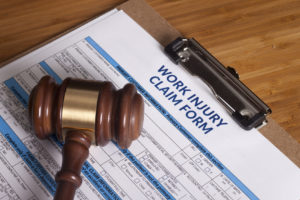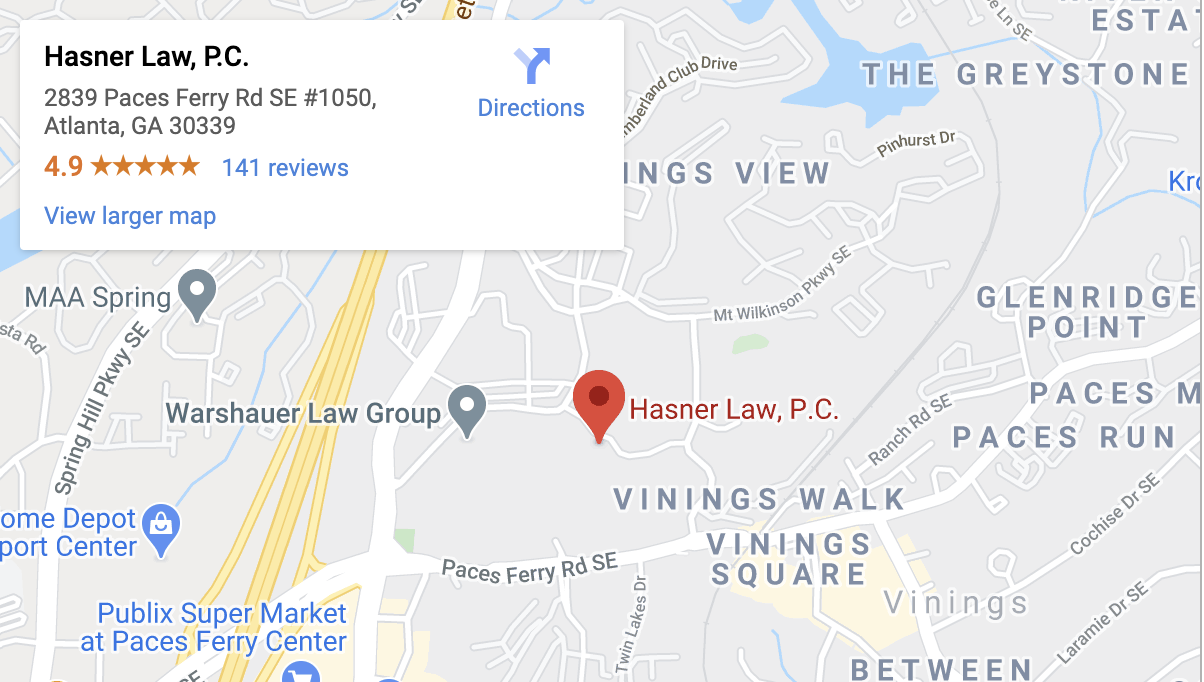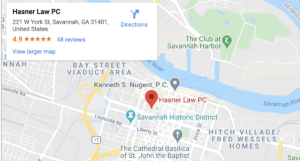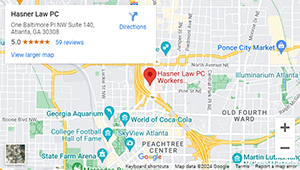Georgia Workers’ Compensation FAQ

Injured in an accident at work? You probably have a lot of questions. Below, our Atlanta workers’ compensation attorneys have answered many of the questions we receive most often.
Do not hesitate to contact us for assistance with your workers’ compensation injury claim. We offer a free consultation, so reach out to us online or give us a call today at (678) 888-4878 to learn more.
Georgia Workers’ Compensation Overview

What is workers’ compensation?
Workers’ compensation is a form of insurance that applies to employees injured on the job. The program provides medical benefits and income lost during periods when you are unable to work. All employers with at least three employees must carry this type of insurance coverage.
When does workers’ compensation coverage begin?
Coverage starts on the first day of your employment.
What should I do if I am hurt on the job?
First, you should report your injury to your employer as soon as possible. Waiting more than 30 days can result in you losing your right to collect workers’ comp benefits.
What injuries does workers’ comp cover?
The program is limited to injuries that take place while an employee is working. This means that the injury must arise out of the employment and occur in the course of work duties. In other words, the injury needs to have happened while you were doing the work you were paid to do and resulted from that work.
Note that the injury does not need to occur on your employer’s premises. It will be covered so long as it happened in the course of your work. For example, delivery drivers injured on the road while making deliveries would be entitled to workers’ comp.
What types of activities are not covered by workers’ comp?
In most cases, you are not eligible for benefits if your injury happened while you were on a scheduled lunch break. Further, note that your commute to and from work is not considered working. This means that injuries occurring during this time would not be eligible for workers’ comp.
Engaging in horseplay that leads to an accident would also likely disqualify you from benefits. Similarly, accidents caused by intentional misconduct, such as fighting or working while intoxicated, would fall outside workers’ comp coverage.
Workers’ Compensation Benefits in Georgia

What benefits am I entitled to?
Being hurt on the job entitles you to medical treatment, rehabilitation, and lost income during the period when you are unable to work. You may also be able to receive compensation for certain necessary travel expenses associated with obtaining medical care.
If you are unable to work, the amount of lost income you can receive is set by law. For injuries occurring after July of 2019, this is calculated to be two-thirds of your average weekly wage up to a maximum of $675 per week. So, if your weekly income is $600, you would be entitled to $400 per week from workers’ comp.
In cases where an injury results in death, workers’ comp provides benefits to your dependents, including funeral expenses.
What if I can only return to working a lower-paying job?
In this case, you would still be entitled to some amount of income benefits. The amount will depend on the difference between what you earned at your previous job and your current wages. For example, if you earned $600 per week at your previous job and are now only able to earn $550 at your new position, you would be entitled to $50 per week in benefits.
Note that for injuries occurring after July of 2019, the difference covered by workers’ comp cannot exceed $450 per week.
How are injuries categorized under workers’ comp?
Workplace injuries are classified as either temporary or permanent and partial or total. Partial means that you can continue to work, but in a diminished capacity or on light duty. Total means that you cannot work at all.
How long do benefits last for temporary partial injuries?
For these injuries, you are allowed to receive income benefits until you reach either a maximum of 350 weeks from the date of injury, or obtain what is referred to as maximum medical improvement. Maximum medical improvement means that you have either reached a state where your condition cannot be improved any further, or the healing process has hit a treatment plateau.
How long do benefits last for temporary total injuries?
These types of injuries mean that you cannot work in any capacity. In this case, you can receive benefits until you reach either maximum medical improvement or for up to 400 weeks from the date of the injury.
How long do benefits last for permanent partial injuries?

Permanent partial injury benefits depend on whether your particular injury is specifically mentioned in the law. Examples of these types of injuries include loss of limbs, eyesight and hearing. Each type of injury will correspond to a specific period of payments. For instance, losing and index finger entitles you to 40 weeks of benefits.
If your injury is not on the list, the number of weeks you can collect is based on the disability rating to your body as a whole. Being rated at 100% disabled would entitle you to the maximum of 300 weeks of benefits. This means that if you are found to be 50% disabled, you would be entitled to receive 150 weeks of income.
How long do benefits last for permanent total injuries?
To be considered permanent, your injury must prevent you from working. In this case, you may be entitled to income benefits for the rest of your life. The amount you would receive would be the same as if your injury was temporary. The only difference is that there would be no time limit for your benefits.
Am I entitled to compensation for pain and suffering?
No. Workers’ comp is limited to medical treatment, rehabilitation costs, and employment income. There are no benefits for pain and suffering.
Can I get a lump sum settlement instead of weekly payments?
Yes. You can negotiate with your insurance company to structure your payments for medical bills, rehabilitation costs, and lost income. That includes getting a lump sum settlement.
However, note that settlements are final. This means that once you settle you are not allowed to ask for more money. This is true even if your condition worsens or you have additional medical bills.
Can I also receive social security benefits?
It is possible to receive both workers’ comp and social security disability. However, note that the qualifications and filing procedures differ. Further, your social security benefits may be reduced based on how much you are receiving in workers’ comp.
Medical Treatment
Can I choose my own doctor?
Not necessarily. Your employer is required to provide a list of at least six doctors you may visit after a work-related injury. You can choose from that list, but you will not be covered if you see a doctor not approved by your employer. However, you do not need your employer’s permission to change doctors, provided they are on the list.
What happens in an emergency?
You can go directly to the ER in cases of emergency. The medical professional that treats you does not need to be on the list of approved doctors. But, your condition must be truly an emergency situation. Further, any follow-up care must be obtained through an approved doctor.
How will I pay my medical bills?
You should not be directly billed so long as you seek treatment with an authorized doctor, Your health care will be fully covered by workers’ compensation. For emergency medical care, you will need to request reimbursement through the program.
Workers’ Comp Disputes

What happens if my employer does not pay the benefits that are owed to me?
In this case, your employer would be required to pay a penalty. This amount would then be added to your total benefit payment.
What happens if my employer denies my claim?
If denied, you can file a worker’s compensation claim by filing an appeal with the State Board of Workers’ Compensation and request a hearing. The hearing will be held before an administrative law judge. Hearings are typically scheduled within 60 days of filing the request.
Can I have an attorney represent me at the hearing?
Yes. You may have an attorney represent you or you may represent yourself. However, a qualified Georgia workers’ comp attorney will ensure that your claim is filed correctly. This will help you get the benefits you deserve.
How long do I have to file a claim with the State Board of Workers’ Compensation?
One year from the date of your injury.
Can I get workers’ comp if the accident was my fault?
Yes. Georgia’s workers’ compensation system provides what is known as “no fault” coverage. This means that a worker is still eligible for benefits even if he or she acted negligently and was to blame for the accident. However, bear in mind that you cannot receive workers’ comp if you intentionally caused the accident or behaved with extreme recklessness.
Can I sue my employer instead of filing for workers’ comp?
Typically, no. Workers’ comp is considered the exclusive remedy for on-the-job injuries. But, there are a few limited exceptions.
One exception would be if your employer does not provide workers’ comp coverage. This could be because they are not legally required to, or because they failed to obtain coverage. Either way, in this case you would be entitled to sue your employer directly.
Another exception is if your employer intentionally harmed you. These cases can be complex, so it can be helpful to speak to a qualified attorney if you have questions.
Contact Our Workers’ Compensation Law Firm in Atlanta For Help Today
Injured workers might be entitled to benefits after an on the job accident. However, navigating a workers’ compensation claim for benefits can be tough. That’s particularly true when you’re dealing with a painful injury. You don’t have to do it on your own. The Atlanta workers’ compensation lawyers at Hasner Law Injury & Workers’ Compensation Attorneys are here to help you in any way that we can. When you call us for help, you’ll benefit from our more than 70 combined years of experience handling complex workers’ comp matters.
Give our Atlanta law office a quick call to schedule a free consultation with our skilled legal team. We’ll review your case, explain your rights, and answer the questions you might have.





